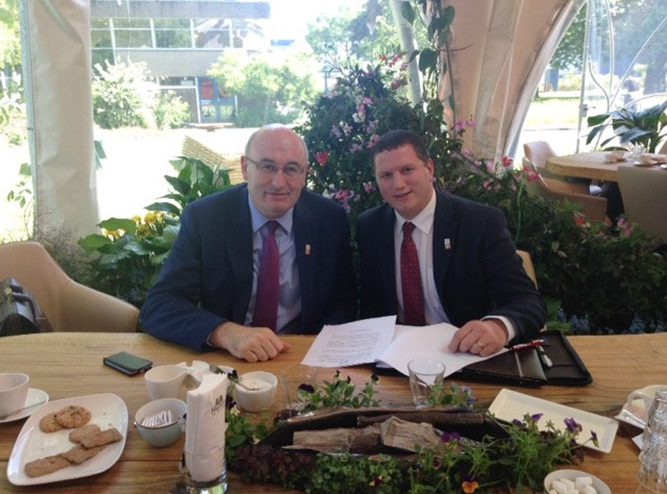
Farming has evolved over the years to such an extent that technology and science play a massive part in the day to day running of any farm.
Gone are the days when the stereotypical farmer is a guy who leaves school at a young age and carries on the same process that his or her elders have done before them.
Education plays a massive part in farming these days also and the younger generation of farmer in Ireland are all acquiring third level education in order to bring their farm forward.
It is now easy for young farmers to progress in the manner they want to though and that is why CEJA was established. CEJA is the European Council of Young Farmers and acts as a voice of Europe’s next generation of farmers to the European institutions.
The current president of CEJA is Cork man Alan Jagoe who manages to juggle his role in Brussels with that of running a farm back home in Nohoval.
For this month’s edition of Irish Tractor & Agri, we profile Alan and speak to him about his role in Brussels and how he copes with his busy schedule.
Alan along with his father Edward and brother George run the family farm which consists of 400 acres split between dairy and tillage.
His wife Helen and daughter Laura have supported Alan throughout his term as both president of Macra and current CEJA president.
“I’m in Brussels about three or four times a month for meetings, so I’m lucky in that my father Edward and my brother George are part of our family partnership farm, so when I’m away, they are looking after the farm,’ said Alan. “My wife Helen has been great support to me. We have one daughter called Laura, while we have another on the way, so things might be a little more hectic for a while,” joked Alan.
He admits that his role with CEJA is a demanding one as there are numerous issues to contend with all the time.
‘There are a lot of challenges and obstacles with this position and I’m dealing with issues that I’ve dealt with before as Macra president but this is on a wider scale.’
Having a passion for what he does, has helped Alan rise through the ranks to his current position, having previously being CEJA vice-chairman for two years.
“I was nominated for the vice-president role two days before my wedding to my wife Helen, so that was pretty eventful. But, having discussed it with her, I decided to go forward and I’m delighted to be involved and try to get the voice of the young farmers across to the relevant bodies.”
Some examples of his work included the very successful Macra/CEJA Young Farmers conference in March 2013 in Dublin. Alan was also instrumental in conducting studies and reports into land mobility and succession and also very significant work with CAP reform in Ireland.
“I do feel that we are making strides and we get a fair hearing. CEJA represents 33 organisations across Europe consisting of up to two millions farmers. It is a very interesting role and our aim is to introduce a new policy for young farmers and try to secure more funding for them. Young farmers are getting very little entitlements as it stands and it is holding them back, a fundamental change is needed.
“There is progress being made and in fairness everyone is willing to listen to our grievances. We as the voice of the young farmer want to see them become more productive.”
Alan admits that being involved in such a role offers him insight into the different perspectives people have of farming across the EU.
“It opens your mind to different thinking when you’re out meeting other farmers and politicians. We take what we do here for granted, but when you see other countries you can see that we’re far ahead in some respects.”
From an Irish perspective, Alan feels that the Government need to do more help young farmers in this country.
“The Government here is doing a bit, but more needs to be done in my opinion. There is a lot of vocal discontent amongst our young farmers. We are going in the right direction, but not as quickly as most people would like.”
Alan, George and Edward milk 200 cows and they have expanded a lot in the past 10 years by buying a lot of quotas and now that it is gone it will allow the farm to reach its potential. Alan also feels that the farm advisory services play a hugely important role in helping and education farmers.
“Teagasc are great in what they do and they show what farmers are able to do and we need more services like that. I also think the work that macra done goes largely unnoticed while the support they receive from IFAC Accountants is unmeasurable.”
As a partner in a family farm, Alan sees a huge future for family farms in Ireland as we are not equipped to be set out like bigger countries.
“Ireland will never be like New Zealand where they have big industrial farms on huge tracts of land. Small family farms are the model that keeps rural Ireland together.
“I would definitely recommend a career in agriculture as there are huge opportunities for us as Irish farmers and, with the huge world population, we are in prime position to be at the helm of feeding them.’
Alan Jagoe
Nohoval,
Cork
Taken from Irish Tractor & Agri magazine Vol 4 No 9, November/December 2016